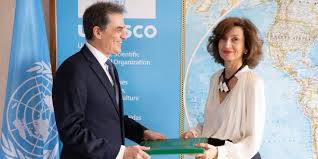In a decision that has triggered widespread anger across Syrian communities at home and abroad, the Syrian Council of Ministers has appointed Dr. Louay Fallouh—a staunch defender of the former Assad regime and vocal opponent of the Syrian revolution—as Syria’s new ambassador to Paris. The announcement was met with swift and scathing criticism on social media, with activists denouncing the move as a continuation of political favoritism and a setback for any hope of genuine diplomatic reset.
A Controversial Symbol of the Old Guard
Dr. Fallouh, an academic and longtime regime loyalist, is no stranger to controversy. Over the years, he has publicly praised Bashar al-Assad’s leadership, repeatedly accused Western governments and Turkey of “sponsoring terrorism,” and vilified Syrian opposition groups. His most prominent public appearances have involved delivering combative statements in defense of Assad’s policies at international forums—including the UN Security Council and UNESCO—where he served as Syria’s permanent representative.
To many Syrians, particularly those who supported or participated in the 2011 uprising, Fallouh embodies the continuity of the repressive and insular mindset that fueled decades of state violence and diplomatic isolation. “How can someone who has consistently denounced the revolution and justified repression represent us abroad?” one activist wrote. Another commented: “This is not diplomacy—it’s a reward for loyalty, not merit.”
More Than Symbolism: A Signal of Policy Direction
Critics argue that the appointment reflects a deliberate choice by the transitional government to prioritize political allegiance over diplomatic credibility. Fallouh’s track record includes:
- Pledging loyalty to Assad in 2023 when he took his oath as Syria’s permanent delegate to UNESCO in Paris.
- Delivering Assad’s personal greetings to Pope Francis upon assuming his post at the Vatican, whitewashing the regime’s crimes with rhetoric about “humanitarian stability.”
- Blaming Turkey for terrorism in Syria and calling for the removal of its “illegal military presence” during a 2019 Security Council session.
- Demanding the lifting of Western sanctions, framing them as “unilateral coercive measures” obstructing Syria’s reconstruction efforts.
- Publicly denying regime use of chemical weapons, despite overwhelming evidence to the contrary, and insisting Syria remains committed to non-proliferation.
- Urging Syrian refugees to return, claiming government-secured “stability”—a claim widely rejected by human rights monitors.
- Lashing out at France, the UK, and the U.S., accusing them of “blatant interference” and support for “terrorist militias.”
These stances, critics warn, are not merely ideological; they carry serious implications for the credibility of Syria’s foreign policy, especially at a time when the country is seeking to re-engage with international partners after years of isolation and sanctions.
Missed Opportunity for a Reset?
Syria’s diplomatic corps has undergone frequent reshuffles in recent years, often driven more by political calculation than long-term strategic vision. With the recent lifting of U.S. sanctions and the beginning of a fragile post-Assad transition, many had hoped for a new era of diplomatic professionalism and outreach.
Instead, Fallouh’s appointment is widely seen as a missed opportunity to rebuild trust—not only with host governments like France but with the broader Syrian diaspora, particularly those exiled by the very regime Fallouh has championed. Calls from civil society to nominate independent, reform-minded diplomats who have paid a personal price for opposing authoritarianism have gone unheeded.
“This is not a new Syria,” one political commentator noted. “This is the old Syria wearing a new suit.”
Can Fallouh Change Course?
Whether Fallouh will moderate his tone or continue serving as a mouthpiece for Assad-era narratives remains to be seen. But many are skeptical. His diplomatic past is littered with inflammatory rhetoric, ideological rigidity, and unwavering defense of state violence. As one opposition figure put it, “History doesn’t forget, and the people don’t forgive.”
In appointing Louay Fallouh, Syria’s transitional leadership has sent a message—intentional or not—that loyalty still outweighs accountability, and that meaningful change in how Syria engages with the world may remain elusive.
This article was translated and edited by The Syrian Observer. The Syrian Observer has not verified the content of this story. Responsibility for the information and views set out in this article lies entirely with the author.


